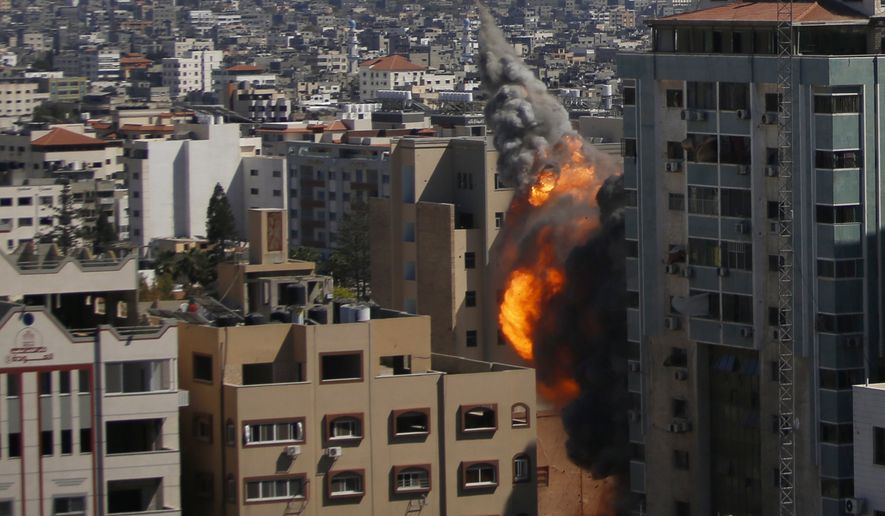The Biden administration struggled to find its diplomatic footing Sunday in a bid to contain escalating clashes between Israel and Palestinian Hamas militants in the Gaza Strip, even as other outside players stepped up their efforts to shape the crisis.
President Biden and top aides have strongly backed Israel’s right to defend itself during a week of violence, and Mr. Biden held his first direct talks with Palestinian Authority President Mahmoud Abbas on Saturday. Secretary of State Antony Blinken worked the phones with calls to his counterparts from Qatar, Saudi Arabia, Egypt and France on Sunday, the State Department said.
But Washington has almost no direct links to the Hamas-dominated administration that controls the Gaza Strip, and the White House has yet to nominate an ambassador to Israel four months into Mr. Biden’s tenure. With influential liberal figures such as Sen. Bernard Sanders of Vermont and Rep. Alexandria Ocasio-Cortez openly questioning the traditional U.S. support for Israel, Mr. Biden is finding he has even less room to maneuver.
As the United Nations, a leading Muslim organization, the European Union and even the pope weighed in, the crisis on the ground went from bad to worse Sunday. The most recent round of violence was sparked earlier this month when Palestinians protested attempts by Jewish settlers to evict a number of Palestinian families from their homes and Israeli police measures at Al-Aqsa Mosque. Gaza’s militant Hamas rulers fired rockets toward Jerusalem late Monday, triggering an Israeli assault on Gaza.
Palestinian medical officials told The Associated Press that fresh Israeli airstrikes had killed at least 42 people Sunday and leveled three buildings in densely populated Gaza City. A defiant Israeli Prime Minister Benjamin Netanyahu said Israel’s campaign would continue at “full force” and that Israel was determined to make the Islamist group pay a “heavy price” for the worst flare-up in Israeli-Palestinian violence in seven years.
The AP reported that Hamas also launched rockets from civilian areas in Gaza toward civilian areas into Israel. One slammed into a synagogue in the southern city of Ashkelon but no injuries were reported.
Deputy Assistant Secretary of State for Israeli-Palestinian Affairs Hady Amr was holding talks in Israel on Sunday, and U.S. U.N. Ambassador Linda Thomas-Greenfield told a Security Council meeting Sunday that the administration “has been working tirelessly through diplomatic channels” to try to end the conflict, but it was clear other powers were not waiting for Washington to take the lead.
At the request of Saudi Arabia, foreign ministers of the 57-member Organization of Islamic Cooperation held an emergency virtual summit Sunday calling for an end to Israeli strikes and military activity in the Gaza Strip. At the virtual meeting, Palestinian Foreign Minister Riad Malki denounced Israel as an “apartheid state” that was practicing “crimes and brutality against our people in Gaza.”
The foreign ministers of Turkey, Iran and Saudi Arabia all condemned what they said was Israeli provocations and aggression that sparked the latest violence.
Riyadh was a prime target of the Trump administration’s push to end Israel’s diplomatic and economic isolation in the region, but Saudi Foreign Minister Prince Faisal bin Farhan Al Saud on Sunday condemned what he called Israel’s “flagrant violations” of Palestinian rights and called for end to the deadly military operations in the Gaza Strip.
The U.N. Security Council’s Sunday session, called by current rotating president China, was its first public discussion of the crisis. The U.S. had delayed calls for an earlier meeting, hoping that regional mediators could contain the fighting. U.N. Secretary-General Antonio Guterres appealed to both sides to pull back to allow a cease-fire to take hold.
“This latest round of violence only perpetuates the cycles of death, destruction and despair, and pushes farther to the horizon any hopes of coexistence and peace.” Mr. Guterres said. “Fighting must stop. It must stop immediately.”
European Union foreign policy chief Josep Borrell announced that foreign ministers of the 27-nation bloc will talk Tuesday to “coordinate and discuss how the EU can best contribute to end the current violence.” Mr. Borrell tweeted that he was convening the meeting in part because of the “unacceptable number of civilian casualties” on both sides in the conflict.
And Pope Francis weighed in at the Vatican with pointed public remarks calling on both sides to stop the violence.
“I ask myself: This hatred and vendetta, what will it bring?” the pope said, addressing a crowd in St. Peter’s Square. “ … In the name of God, who created all human beings equal in rights, duties and dignity and are called to live as brothers, I appeal for calm.”
• David R. Sands can be reached at dsands@washingtontimes.com.




Please read our comment policy before commenting.